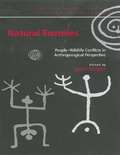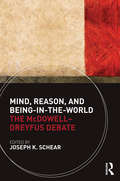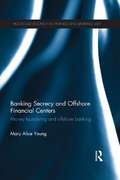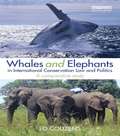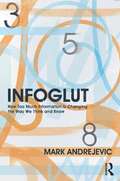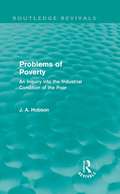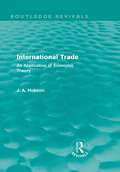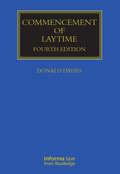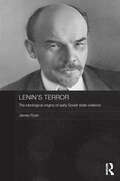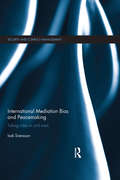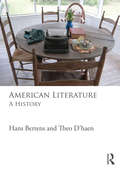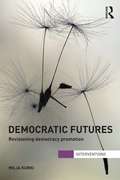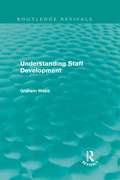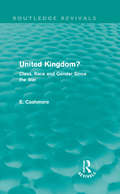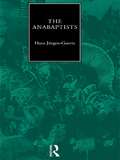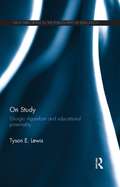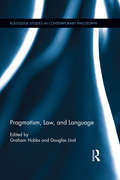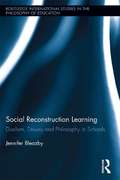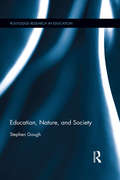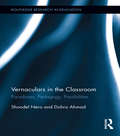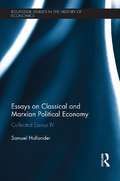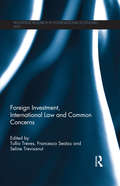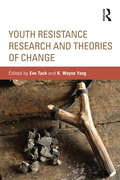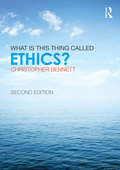Special Collections
Benetech’s Global Certified Accessible Titles
Description: Benetech’s GCA program is the first independent third-party EPUB certification to verify ebook accessibility. By creating content that is born accessible, publishers can meet the needs of all readers. Learn more: https://bornaccessible.benetech.org/
- Table View
- List View
Natural Enemies
by John KnightWild animals raid crops, attack livestock, and sometimes threaten people. Conflicts with wildlife are widespread, assume a variety of forms, and elicit a range of human responses. Wildlife pests are frequently demonized and resisted by local communities while routinely 'controlled' by state authorities. However, to the great concern of conservationists, the history of many people-wildlife conflicts lies in human encroachment into wildlife territory.In Natural Enemies the authors place the analytical focus on the human dimension of these conflicts - an area often neglected by specialists in applied ecology and wildlife management - and on their social and political contexts. Case studies of specific conflicts are drawn from Africa, Asia, Europe and America, and feature an assortment of wild animals, including chimpanzees, elephants, wild pigs, foxes, bears, wolves, pigeons and ducks.These anthropologists challenge the narrow utilitarian view of wildlife pestilence by revealing the cultural character of many of our 'natural enemies'. Their reports from the 'front-line' expose one fact - human conflict with wildlife is often an expression of conflict between people.
Mind, Reason, and Being-in-the-World
by Joseph K. SchearJohn McDowell and Hubert L. Dreyfus are philosophers of world renown, whose work has decisively shaped the fields of analytic philosophy and phenomenology respectively. Mind, Reason, and Being-in-the-World: The McDowell-Dreyfus Debate opens with their debate over one of the most important and controversial subjects of philosophy: is human experience pervaded by conceptual rationality, or does experience mark the limits of reason? Is all intelligibility rational, or is there a form of intelligibility at work in our skilful bodily rapport with the world that eludes our intellectual capacities? McDowell and Dreyfus provide a fascinating insight into some fundamental differences between analytic philosophy and phenomenology, as well as areas where they may have something in common. Fifteen specially commissioned chapters by distinguished international contributors enrich the debate inaugurated by McDowell and Dreyfus, taking it in a number of different and important directions. Fundamental philosophical problems discussed include: the embodied mind, subjectivity and self-consciousness, intentionality, rationality, practical skills, human agency, and the history of philosophy from Kant to Hegel to Heidegger to Merleau-Ponty. With the addition of these outstanding contributions, Mind, Reason, and Being-in-the-World is essential reading for students and scholars of analytic philosophy and phenomenology.
Banking Secrecy and Offshore Financial Centers
by Mary Alice YoungThis book brings together the issues surrounding banking secrecy and confiscation of criminal proceeds. The book examines the existing legal agreements at the international, regional and national levels and their interaction in the substantive areas of confiscation, anti-money laundering and banking confidentiality laws. It looks at how these agreements have been applied in offshore financial centers and demonstrates that despite a number of legally binding UN Conventions as well as global anti-money laundering recommendations, the implementation of them is often lukewarm by those Parties who have ratified the Convention and adopted obligations, because of this the confiscation legislation is incompatible with strict banking confidentiality laws. The work draws on the experience of criminologists to offer critical insight into the legislative frameworks designed to deal with banking secrecy and confiscation in offshore financial centers. It goes on to offer suggestions for measures that may be taken by major economies to circumvent the lack of cooperation by offshore financial centers as intolerance towards money laundering grows in light of recent political and economic events. This book will be of particular interest to students and scholars of Law, Finance and Criminology.
Whales and Elephants in International Conservation Law and Politics
by Ed CouzensWhales and elephants are iconic giants of the marine and terrestrial animal world. Both are conspicuous representatives of wildlife conservation. The issues of whaling and the ivory trade are closely linked, both legally and politically, in many ways; some obvious, and some surprising. The treatment of both whales and elephants will be politically and legally contentious for years to come, and is of great significance to conservation in general. This book examines the current state of international environmental law and wildlife conservation through a comparative analysis of the treatment of whales and elephants. In particular, it describes the separate histories of international governance of both whales and elephants, presenting the various treaties through which conservation has been implemented. It is shown that international environmental law is influenced and shaped by important political actors – many with opposing views on how best conservation, and sustainable development, principles are to be implemented. Modern environmental treaties are changing as weaknesses and loopholes are exposed in older, and possibly outdated, treaties such as the Convention on International Trade in Endangered Species of Wild Fauna and Flora (CITES) and the International Convention for the Regulation of Whaling (ICRW). Such weaknesses can be seen in the efforts made by some states to circumvent or weaken CITES and the International Whaling Commission and to resume commercial whaling, and further in the efforts of countries to resume trade in ivory. The argument is made that the Convention on Biological Diversity could be used to begin reconciling opposed views and to focus conservation efforts. The argument is made that effective conservation of species cannot be achieved through individual treaties, but only through a synergistic approach involving multilateral environmental agreements – 'ecosystems of legal instruments'.
Infoglut
by Mark AndrejevicToday, more mediated information is available to more people than at any other time in human history. New and revitalized sense-making strategies multiply in response to the challenges of "cutting through the clutter" of competing narratives and taming the avalanche of information. Data miners, "sentiment analysts," and decision markets offer to help bodies of data "speak for themselves"—making sense of their own patterns so we don’t have to. Neuromarketers and body language experts promise to peer behind people’s words to see what their brains are really thinking and feeling. New forms of information processing promise to displace the need for expertise and even comprehension—at least for those with access to the data. Infoglut explores the connections between these wide-ranging sense-making strategies for an era of information overload and "big data," and the new forms of control they enable. Andrejevic critiques the popular embrace of deconstructive debunkery, calling into question the post-truth, post-narrative, and post-comprehension politics it underwrites, and tracing a way beyond them.
Problems of Poverty
by J. A. HobsonFirst published in 1891, this seminal work examines the primary causes of poverty during the industrial age. Through considering how poverty is measured, the growth of urbanisation and the supply of low-skilled labour in the workforce, Hobson arrives at possible solutions to the problem of poverty and explores the ethical issues surrounding it.
International Trade
by J. A. HobsonFirst published in 1904, this important economic work explores some of the leading principles underlining the development of international trade. Hobson offered a departure from the conventional treatment of international trade in economic theory, simplifying concepts of free trade, exchange and tariffs and considering the practical application of theory in a manner accessible to the reader.
Commencement of Laytime
by Davies DonaldCommencement of Laytime is the only in-depth examination and discussion concerning the most important financial aspect of laytime which can affect all voyage charter parties and international contracts for the sale of goods. The information is presented in a style which is readable by ship operators, traders and other lay persons as well as legal professionals.
Lenin's Terror
by James RyanThis book explores the development of Lenin’s thinking on violence throughout his career, from the last years of the Tsarist regime in Russia through to the 1920s and the New Economic Policy, and provides an important assessment of the significance of ideological factors for understanding Soviet state violence as directed by the Bolshevik leadership during its first years in power. It highlights the impact of the First World War, in particular its place in Bolshevik discourse as a source of legitimating Soviet state violence after 1917, and explains the evolution of Bolshevik dictatorship over the half decade during which Lenin led the revolutionary state. It examines the militant nature of the Leninist worldview, Lenin’s conception of the revolutionary state, the evolution of his understanding of "dictatorship of the proletariat", and his version of "just war". The book argues that ideology can be considered primarily important for understanding the violent and dictatorial nature of the early Soviet state, at least when focused on the party elite, but it is also clear that ideology cannot be understood in a contextual vacuum. The oppressive nature of Tsarist rule, the bloodiness of the First World War, and the vulnerability of the early Soviet state as it struggled to survive against foreign and domestic opponents were of crucial significance. The book sets Lenin’s thinking on violence within the wider context of a violent world.
International Mediation Bias and Peacemaking
by Isak SvenssonThis book examines the effect of biased and neutral mediators in civil wars. Based on analysis of both global data and case studies of contemporary peace processes, including India and Norway in Sri Lanka, China in Cambodia, US in Israel/Palestine, and Russia in Georgia, the book makes two main contributions. First, it explores the role of biased mediators in contemporary peace processes. The author develops a theory explaining why biased mediators are more effective than their neutral counterparts and the book identifies four different mechanisms through which biased mediators can be effective peace-brokers. By developing a comprehensive set of mechanisms to explain bias mediation, the work deepens understanding of biased mediators in general, and their role in resolving civil conflict in particular. The second contribution offered is a novel way of measuring mediation success. Previous research has concentrated on settlement, behavior, or implementation. While these conceptualisations of mediation success all have merit, they fail to address how the basic incompatible positions are regulated. This book focuses on mediators’ ability to regulate core compatibilities by crafting institutional peace arrangements that generally are considered to enhance the prospect for durable peace. This approach has wider implications for peace and conflict research by bringing together research on durability of peace and studies on international mediation, two fields of research which hitherto have been kept apart. This book will be of much interest to students of international mediation, conflict management, civil wars, security studies and IR in general.
American Literature
by Hans Bertens and Theo D'haenThis comprehensive history of American Literature traces its development from the earliest colonial writings of the late 1500s through to the present day. This lively, engaging and highly accessible guide:
offers lucid discussions of all major influences and movements such as Puritanism, Transcendentalism, Realism, Naturalism, Modernism and Postmodernism
draws on the historical, cultural, and political contexts of key literary texts and authors
covers the whole range of American literature: prose, poetry, theatre and experimental literature
includes substantial sections on native and ethnic American literatures
explains and contextualises major events, terms and figures in American history.
This book is essential reading for anyone seeking to situate their reading of American Literature in the appropriate religious, cultural, and political contexts.
Democratic Futures
by Milja KurkiDemocracy promotion has been an influential policy agenda in many Western states and international organisations, and amongst many NGO actors. But what kinds of models of democracy do democracy promoters promote? This book examines in detail the conceptual orders that underpin democracy support activity, and the conceptions of democracy that democracy promoters, consciously or inadvertently, work with. Such an examination is not only timely but much-needed in today’s context of multiple democratic and financial crises. Contestation over democracy’s meaning is returning, but how is this contestation reflected, if at all, in democracy promotion policies and practices? Seeking to open up debate on multiple models of democracy, this text provides the reader not only with the outlines of various possible politico-economic models of democracy, but also with a close empirical engagement with democracy promoters’ discourses and practices. Drawing on a broad spectrum of examples, it exposes the challenges faced by Western governments in trying to reshape the political and economic landscape across the world and tentatively advances a set of concrete policy provocations which may enable a more pluralist and flexible democracy promotion practice to emerge. This innovative new work will be essential reading for all students of democratisation, democracy promotion and international relations.
Understanding Staff Development
by Graham WebbFirst published in 1996, this book charts the philosophical landscape of staff development at a time when the subject of ‘quality’ in university teaching and learning was under examination. Graham Webb considers three main issues in his research. He focuses on what the basis for educational and staff development actually is and looks at the weaknesses of the then current practices, as well as deliberating over the future of informed staff development. This book will be of interest to staff developers of all kinds and more generally, to anyone concerned with education and human development.
United Kingdom?
by E. CashmoreFirst published in 1989, United Kingdom? examines the three main divisions in British society in the post-war period: class, race and gender. During the 1980s there was an increasing concern about deep, and often bitter, divisions in British society. Events such as the miners’ strike of 1984-5, the riots in Handsworth, Tottenham and Brixton, and the women’s peace camp at Greenham Common all demonstrated the opposing views and cultures of the British public. However, the UK at the time was also able to show remarkable and continuing stability in other areas. This book considers to what extent the United Kingdom really was a kingdom united from the post-war period to the late 1980s. It focuses on issues of cohesion and conflict and debates the security of essential social stability.
Your Dieting Daughter
by Carolyn CostinYour Dieting Daughter is a must read for anyone wanting to help contribute to a young woman’s development of a healthy self and body esteem, whether she is 13 or 30. Costin has updated the first edition of this book to reflect her 15 additional years of expertise on dealing with the tricky issues of body image, food, and weight in a culture that places an unhealthy emphasis on being thin. From aiding a young girl to lose weight for health reasons; to encouraging a young woman to accept her natural body size; to helping detect, prevent, and understand eating disorders, this second edition is full of practical and invaluable information. Chapters guide parents in the Do’s and Don’ts that will help a daughter to accept, respect, and care for her body. Readers will learn the importance of setting a good example and the critical need to take the focus from numbers and measurements - such as scale weight, clothing size, miles run, or sit-ups accomplished - to important goals like health, body acceptance, and finding physical activity to enjoy. Whether you are interested in being a good role model for you daughter, helping girls and women who are currently suffering from an eating disorder or body image issues, or raising the next generation of girls to value the size of their heart over their body size, this is a book not to be missed.
The Anabaptists
by Hans-Jurgen GoertzThe Anabaptists were at the radical, utopian edge of the Reformation, ruthlessly repressed by Catholic, Lutheran and secular authorities alike. Hans-Jurgen Goertz gives a comprehensive account of their political and religious significance, their views, and their social setting within the wider context of the Reformation. Particular attention is paid to the role and experience of women and of 'ordinary' Anabaptists in addition to those of the educated elite. Whilst the focus of the book is on Germany, extensive coverage is also given to Anabaptism in England, Switzerland, the Netherlands and elsewhere. This English edition includes a new introduction which considers the historiographical context of the book. The opening chapter has also been expanded to include a section on the emergence of Anabaptism in England. The Anabaptists has been fully revised since its publication in German, and takes account of the most recent historiography on the subject. It also includes a selection of primary sources together with a full listing of important Anabaptist works.
On Study
by Tyson E. LewisIn an educational landscape dominated by discourses and practices of learning, standardized testing, and the pressure to succeed, what space and time remain for studying? In this book, Tyson E. Lewis argues that studying is a distinctive educational experience with its own temporal, spatial, methodological, aesthetic, and phenomenological dimensions. Unlike learning, which presents the actualization of a student’s "potential" in recognizable and measurable forms, study emphasizes the experience of potentiality, freed from predetermined outcomes. Studying suspends and interrupts the conventional logic of learning, opening up a new space and time for educational freedom to emerge. Drawing upon the work of Italian philosopher and critical theorist Giorgio Agamben, Lewis provides a conceptually and poetically rich account of the interconnections between potentiality, freedom, and study. Through a mixture of educational critique, phenomenological description, and ontological analysis, Lewis redeems study as an invaluable and urgent educational experience that provides alternatives to the economization of education and the cooptation of potentiality in the name of efficiency. The resulting discussion uncovers multiple forms of study in a variety of unexpected places: from the political poetry of Adrienne Rich, to tinkering classrooms, to abandoned manifestos, and, finally, to Occupy Wall Street. By reconnecting education with potentiality this book provides an educational philosophy that undermines the logic of learning and assessment, and turns our attention to the interminable paradoxes of studying. The book will be key reading for scholars in the fields of educational philosophy, critical pedagogy, foundations of education, composition and rhetoric, and critical thinking and literacy studies.
Pragmatism, Law, and Language
by Graham Hubbs and Douglas LindThis volume puts leading pragmatists in the philosophy of language, including Robert Brandom, in contact with scholars concerned with what pragmatism has come to mean for the law. Each contribution uses the resources of pragmatism to tackle fundamental problems in the philosophy of language, the philosophy of law, and social and political philosophy. In many chapters, the version of pragmatism deployed proves a fruitful approach to its subject matter; in others, shortcomings of the specific brand of pragmatism are revealed. The result is a clearer understanding of what pragmatism has meant and can mean across these tightly related philosophical areas. The book, then, is itself pragmatism in action: it seeks to clarify its unifying concept by examining the practices that centrally involve it.
Social Reconstruction Learning
by Jennifer BleazbyThis volume argues that educational problems have their basis in an ideology of binary opposites often referred to as dualism, which is deeply embedded in all aspects of Western society and philosophy, and that it is partly because mainstream schooling incorporates dualism that it is unable to facilitate the thinking skills, dispositions and understandings necessary for autonomy, democratic citizenship and leading a meaningful life. Drawing on the philosophy of John Dewey, feminist pragmatism, Matthew Lipman’s Philosophy for Children program, and the service learning movement, Bleazby proposes an approach to schooling termed "social reconstruction learning," in which students engage in philosophical inquiries with members of their community in order to reconstruct real social problems, arguing that this pedagogy can better facilitate independent thinking, imaginativeness, emotional intelligence, autonomy, and active citizenship.
Education, Nature, and Society
by Stephen GoughEnvironmental issues continue to divide opinion, sometimes in extreme ways. Almost everyone agrees that education has a role to play in ensuring the future of humanity on Earth. Some think we should all learn to leave a minimal environmental footprint; others argue that education should promote economic growth, because only growth can generate the capital needed to develop solutions to environmental problems. Advocates on each side often find the views of their opponents simply incredible, giving rise to accusations of bad faith or poor science. This book explores the foundations of the debate by examining human interrelations with Nature. It takes an educational perspective, but also draws on evidence from anthropology, economics, ecology, policy sciences and natural history. The case presented is that any coherent view of the purposes and potential of education requires a theory of human society in the natural world. For such a theory, education (and, more broadly, learning) must be more than an instrument for the achievement of personal or policy goals. Rather, it is an integral, continuing and necessary component of personal and policy development. On this basis, a novel approach to curriculum design and implementation is outlined.
Vernaculars in the Classroom
by Dohra Ahmad and Shondel NeroThis book draws on applied linguistics and literary studies to offer concrete means of engaging with vernacular language and literature in secondary and college classrooms. The authors embrace a language-as-resource orientation, countering the popular narrative of vernaculars as problems in schools. The book is divided into two parts, with the first half of the book providing linguistic and pedagogical background, and the second half offering literary case studies for teaching. Part I examines the historical and continued devaluing of vernaculars in schools, incorporating clear, usable explanations of relevant theories. This section also outlines the central myths and paradoxes surrounding vernacular languages and literatures, includes productive ways for teachers to address those myths and paradoxes, and explores challenges and possibilities for vernacular language pedagogy. In Part II, the authors provide pedagogical case studies using literary texts written in vernacular Englishes from around the world. Each chapter examines a vernacular-related topic, and concludes with discussion questions and writing assignments; an appendix contains the poems and short stories discussed, and other teaching resources. The book provides a model of interdisciplinary inquiry that can be beneficial to scholars and practitioners in composition, literature, and applied linguistics, as well as students of all linguistic backgrounds.
Essays on Classical and Marxian Political Economy
by Samuel HollanderSamuel Hollander’s work has been provoking debate for over four decades. This book brings together key contributions of recent years, in addition to some brand new pieces. The essays are introduced by a Preface in which Hollander reflects on his past work and reactions to it. Highlights include two issues of particular current relevance. Conspicuous is an extensive chapter regarding Adam Smith’s often neglected arguments for government intervention in the economy to correct market failures, and his critical view of the business class as an anti-social force. Important economists considered in relation to Adam Smith’s position on the role of the state include Jeremy Bentham and the Scottish-Canadian John Rae. Similarly of high present-day interest is a re-examination of Karl Marx’s theory of exploitation, or the notion of profits as "embezzlement," demonstrating Marx’s effective abandonment of this perspective in the case of the small active businessman as distinct from the major joint-stock corporation. Other papers demonstrate the close intellectual relationship between David Ricardo and Thomas Robert Malthus; the extensive common ground between the British school and the French under the leadership of Jean-Baptiste Say; the failure of a so-called anti-Ricardian opposition in Britain represented by Samuel Bailey; and the denial of a sharp discontinuity between "classical" and later "neo-classical" economics. Finally, several biographical essays are included as well as an extension of the autobiographical account appearing in Collected Essays II.
Foreign Investment, International Law and Common Concerns
by Francesco Seatzu and Seline Trevisanut and Tullio TrevesIncreasingly, transnational corporations, developed countries and private actors are broadening the boundaries of their investments into new territories, in search of a higher return on capital. This growth in direct foreign investment involves serious concerns for both the investor and host state. Various exponents of international civil society and non-governmental organisations persuasively claim that such growth in foreign investments constitutes potential and serious hazards both to the environment and the fundamental rights and freedoms of local populations. This book explores from an international law perspective the complex relationship between foreign investments and common concerns, i.e. values that do not coincide, or do not necessarily coincide, with the interests of the investor and of the host state. It pays particular attention to the role of the main international development banks in reconciling the needs of foreign investors with the protection of common concerns, such as the environment, human rights and labour rights. Among its collection of essays, the volume asks how much "regulatory space" investment law leaves; whether international investment law is an effective means of balancing contrasting interests, and whether investment arbitration currently constitutes a mechanism of global governance. In collecting the outlooks of various experts in human rights, environmental and international economic law, this book breaks new ground in exploring how attention to its legal aspects may help in navigating the relationship between foreign investment and common concerns. In doing so, the book provides valuable insights into the substantive issues and institutional aspects of international investment law.
Youth Resistance Research and Theories of Change
by Eve Tuck and K. Wayne YangYouth resistance has become a pressing global phenomenon, to which many educators and researchers have looked for inspiration and/or with chagrin. Although the topic of much discussion and debate, it remains dramatically under-theorized, particularly in terms of theories of change. Resistance has been a prominent concern of educational research for several decades, yet understandings of youth resistance frequently lack complexity, often seize upon convenient examples to confirm entrenched ideas about social change, and overly regulate what "counts" as progress. As this comprehensive volume illustrates, understanding and researching youth resistance requires much more than a one-dimensional theory. Youth Resistance Research and Theories of Change provides readers with new ways to see and engage youth resistance to educational injustices. This volume features interviews with prominent theorists, including Signithia Fordham, James C. Scott, Michelle Fine, Robin D.G. Kelley, Gerald Vizenor, and Pedro Noguera, reflecting on their own work in light of contemporary uprisings, neoliberal crises, and the impact of new technologies globally. Chapters presenting new studies in youth resistance exemplify approaches which move beyond calcified theories of resistance. Essays on needed interventions to youth resistance research provide guidance for further study. As a whole, this rich volume challenges current thinking on resistance, and extends new trajectories for research, collaboration, and justice.
What is this thing called Ethics?
by Christopher BennettWhat is morality? How do we define what is right and wrong? How does moral theory help us deal with ethical issues in the world around us? This second edition provides an engaging and stimulating introduction to philosophical thinking about morality. Christopher Bennett provides the reader with accessible examples of contemporary and relevant ethical problems, before looking at the main theoretical approaches and key philosophers associated with them. Topics covered include: life and death issues such as abortion and global poverty; the meaning of life; whether life is sacred and which lives matter; major moral theories such as utilitarianism, Kantian ethics and virtue ethics; critiques of morality from Marx and Nietzsche. What is this Thing Called Ethics? has been thoroughly revised and updated throughout, with a new final chapter on meta-ethics. With boxed case studies, discussion questions and further reading included within each chapter this textbook is the ideal introduction to ethics for philosophy students coming to the subject for the first time.
